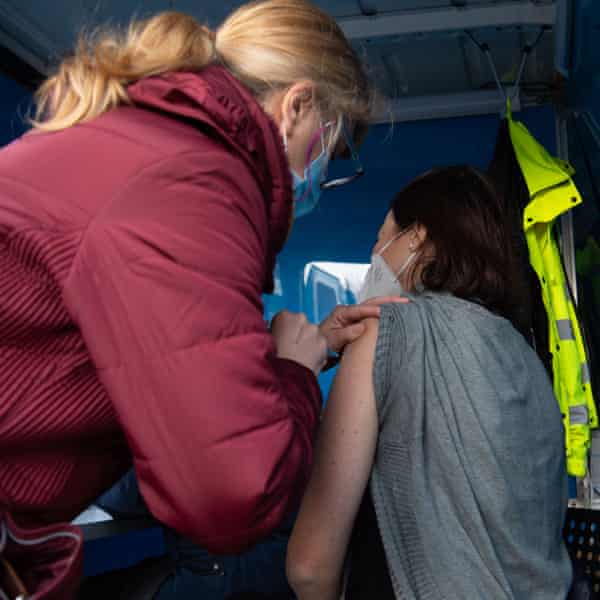Ministers announced a huge expansion of the booster vaccine campaign on Saturday night, amid warnings that further restrictions will be needed imminently to prevent tens of thousands of deaths.
With new Covid measures being discussed in Whitehall and claims of people being turned away from booster walk-in centres, third jabs will be opened up to those in their 30s from Monday in England. Those who had their second jab three months ago or more will be eligible.
It follows a warning from leading scientists that failure to impose tougher Covid restrictions to limit the spread of the Omicrom variant could lead to a further 25,000 to 75,000 deaths over the next five months. The researchers, based at the London School of Hygiene and Tropical Medicine, predicted that a massive wave of infections was likely to sweep the nation in January. At best, this could lead to about 175,000 hospital admissions and 24,700 deaths by the end of April next year.
However, under their most pessimistic scenario, there could be up to 75,000 deaths and a total of 492,000 hospital admissions – the latter figure being almost twice as high as the peak of hospitalisations that were seen in January 2021. It would put a struggling NHS under severe strain.
The team behind the study said the actual outcome will depend on how well the Omicron variant escapes vaccine protection and how effective booster jabs are at restoring protection against the virus.
“We may have to endure more stringent restrictions to ensure the NHS is not overwhelmed,” said Dr Rosanna Barnard, co-leader of the study. “Mask-wearing, social distancing and booster jabs are vital, but may not be enough. Nobody wants to endure another lockdown, but last-resort measures may be required to protect health services.”
But the government’s prospects of successfully imposing new restrictions on the public were questioned on Saturday by senior behavioural experts. They have warned that reports of Downing Street parties, where Covid rules were allegedly flouted last year, have caused widespread anger and resentment.
“It is always more difficult to re-apply restrictions because people are fatigued and generally fed up,” said Linda Bauld, a professor of public health at Edinburgh University. “But now it’s going to be even harder, because trust has been eroded to a very significant level. People are really fed up with the government. And if you don’t trust the government, why would you do what the government asked you to do?”
Bauld said it was likely that far more people would flout rules if they were asked to limit numbers allowed indoors at one time, as happened last winter. “Many are likely to say: I’m fed up, I don’t trust this government, and I want to see my friends and family, so I’m just going to ignore the rule.”
The government is also under extreme pressure from its own backbenchers over the imposition of plan B measures last week.
Boris Johnson faces his biggest-ever parliamentary rebellion on Tuesday, meaning that the restrictions are likely to be enshrined in law only with Labour’s support.
The rebellion will make it harder for Johnson to impose further measures should they be recommended in the days ahead. Whitehall sources said that time was needed to see what effect the measures already imposed had on the course of the virus.
An additional 633 confirmed cases of the Omicron variant were reported across the UK on Saturday, according to the UK Health Security Agency. It brings the total number of confirmed cases to 1,898.
While 30- to 39-year-olds will be able to book their booster from Monday, under-30s have been turning to online forums to find vaccination centres willing to ignore government guidance and offer them the jab.
On Reddit, nearly 25,000 people are a member of the UK community GetJabbed, where they are sharing locations of clinics in cities such as London, Manchester and Liverpool offering boosters to younger people.

One poster linking to a vaccination clinic in Essex said that they were offered the jab within five minutes of arriving, “no questions about age or living in the area”. Another reported getting a jab in Smethwick, near Birmingham, while other under-40s said they had been vaccinated on Saturday in Woking, Basildon, Hounslow and Bristol.
Labour also claimed that on current trends, the government was on course to miss its target of giving everyone a booster jab by the end of January. “The NHS should continue to prioritise those most at risk, including the elderly, housebound and care home residents, but there is no reason others who are eligible and keen to get their booster vaccines now should be turned away,” said Wes Streeting, the shadow health secretary. “We want to make sure everyone can enjoy Christmas safely this year, as well as protecting our NHS. The best way to do that is boosting the booster campaign.”
An NHS spokesperson said: “NHS sites are expected to vaccinate those most at risk from the coronavirus first in line with JCVI [Joint Committee on Vaccination and Immunisation] guidance – which at present is people aged 40 and over, as well as those with health conditions and healthcare workers, but this will be extended to over-30s from Monday.
“The NHS is rapidly mobilising to ensure people are offered lifesaving protection as quickly and as safely as possible so when you are called we strongly advise you to get your booster jab.”
Health chiefs warned that the NHS was now under such stress that further prioritising boosters would have an impact elsewhere in the service. “The NHS will obviously do all it can to speed up the booster injections if that’s what’s needed,” said Chris Hopson, chief executive of NHS Providers, which represents NHS trusts. “But we need to recognise the complex logistics involved, as the government’s chief medical officer stressed [last] week.
“We also need to recognise the wide range of other pressures the NHS is under. Amazing though our staff are, they can’t deliver the impossible. As we saw [last] week with GPs and over- 75 health checks and new patients, we are now at the stage where prioritising a new pressure means deprioritising somewhere else.”
Eleanor Riley, a professor of immunology and infectious disease at Edinburgh University, added that Omicron was now spreading so fast that people were now “very likely” to meet someone infected with the Covid-19 variant.
As a result, a lot of people could still end up in hospital even if the coronavirus mutation proves to provoke milder symptoms than the Delta variant, as some researchers have suggested.
Source: Guardian








